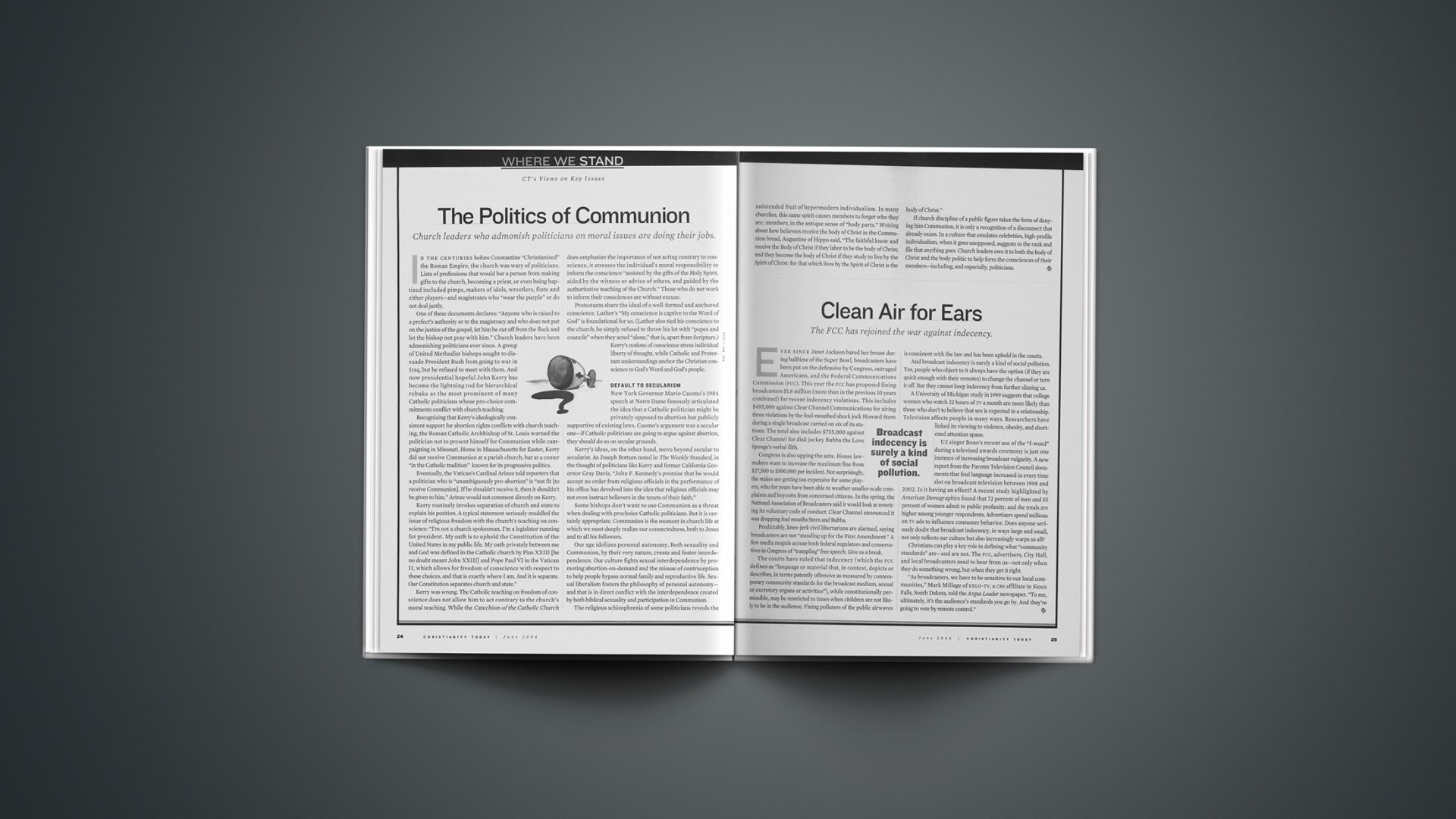Ever since Janet Jackson bared her breast during halftime of the Super Bowl, broadcasters have been put on the defensive by Congress, outraged Americans, and the Federal Communications Commission (FCC). This year the FCC has proposed fining broadcasters $1.6 million (more than in the previous 10 years combined) for recent indecency violations. This includes $495,000 against Clear Channel Communications for airing three violations by the foul-mouthed shock jock Howard Stern during a single broadcast carried on six of its stations. The total also includes $755,000 against Clear Channel for disk jockey Bubba the Love Sponge’s verbal filth.
Broadcast indecency is surely a kind of social pollution.
Congress is also upping the ante. House lawmakers want to increase the maximum fine from $27,500 to $500,000 per incident. Not surprisingly, the stakes are getting too expensive for some players, who for years have been able to weather smaller-scale complaints and boycotts from concerned citizens. In the spring, the National Association of Broadcasters said it would look at rewriting its voluntary code of conduct. Clear Channel announced it was dropping foul mouths Stern and Bubba.
Predictably, knee-jerk civil libertarians are alarmed, saying broadcasters are not “standing up for the First Amendment.” A few media moguls accuse both federal regulators and conservatives in Congress of “trampling” free speech. Give us a break.
The courts have ruled that indecency (which the FCC defines as “language or material that, in context, depicts or describes, in terms patently offensive as measured by contemporary community standards for the broadcast medium, sexual or excretory organs or activities”), while constitutionally permissible, may be restricted to times when children are not likely to be in the audience. Fining polluters of the public airwaves is consistent with the law and has been upheld in the courts.
And broadcast indecency is surely a kind of social pollution. Yes, people who object to it always have the option (if they are quick enough with their remotes) to change the channel or turn it off. But they cannot keep indecency from further sliming us.
A University of Michigan study in 1999 suggests that college women who watch 22 hours of TV a month are more likely than those who don’t to believe that sex is expected in a relationship. Television affects people in many ways. Researchers have linked its viewing to violence, obesity, and shortened attention spans.
U2 singer Bono’s recent use of the “f-word” during a televised awards ceremony is just one instance of increasing broadcast vulgarity. A new report from the Parents Television Council documents that foul language increased in every time slot on broadcast television between 1998 and 2002. Is it having an effect? A recent study highlighted by American Demographics found that 72 percent of men and 55 percent of women admit to public profanity, and the totals are higher among younger respondents. Advertisers spend millions on TV ads to influence consumer behavior. Does anyone seriously doubt that broadcast indecency, in ways large and small, not only reflects our culture but also increasingly warps us all?
Christians can play a key role in defining what “community standards” are—and are not. The FCC, advertisers, City Hall, and local broadcasters need to hear from us—not only when they do something wrong, but when they get it right.
“As broadcasters, we have to be sensitive to our local communities,” Mark Millage of KELO-TV, a CBS affiliate in Sioux Falls, South Dakota, told the Argus Leader newspaper. “To me, ultimately, it’s the audience’s standards you go by. And they’re going to vote by remote control.”
Copyright © 2004 Christianity Today. Click for reprint information.
Related Elsewhere:
After the Super Bowl, Christianity Today interviewed the National Religious Broadcasters’ Frank Wright:
NRB Head: Indecent Airwaves Debate Is Opportunity | Frank Wright says issues over public interest may reshape views of Christian media. (March 25, 2004)
The indecency controversy is still hot according to a news search.










